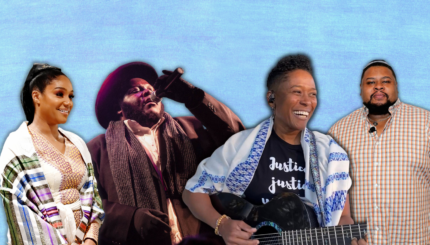Reprinted with permission from The Norman Lear Center at the USC Annenberg School for Communication & Journalism.
The 1970s witnessed a substantial increase in ethnic shows on the air, especially those dealing with African Americans, a response to the more tolerant social climate of the period and the growing ethnic pride movement. By 1975, more than half of the top twenty shows involved major characters who were members of recognizable minority or ethnic groups–e,g, Sanford and Son, The Jeffersons, Good Times, Chico and the Man, Hawaii Five-O, Columbo, and Rhoda, which had a Jewish character in a leading role.
In 1974-75, the peak year of this ethnic celebration, six out of the seven top television shows had leading minority characters. From “virtually denying minorities representation on the air” television thus moved to a “seeming obsession” with them. The extraordinary success of the 1977 miniseries Roots, which followed an African-American family from slavery to the present, perfectly captured the public’s desire for programming that reveled in ethnic heritage; the next year came the miniseries Holocaust, which similarly attracted huge interest both in the United States and abroad.

Valerie Harper played Rhoda Morgenstern on
The Mary Tyler Moore Show.
Photo courtesy of Maggiejumps.
The first program to portray the massive horrors of the Holocaust, the show not only opened up the devastation of the to full public scrutiny but, in the words of Jonathan and Judith Pearl, “cemented the permission for Jews to be fully Jewish both on screen and off.”

Help us keep Jewish knowledge accessible to millions of people around the world.
Your donation to My Jewish Learning fuels endless journeys of Jewish discovery. With your help, My Jewish Learning can continue to provide nonstop opportunities for learning, connection and growth.
Rhoda Morgenstern
In terms of comedy, the popular Mary Tyler Moore Show, which ran from 1970 to 1977, heralded another milestone for Jews, marking the first appearance of a Jewish woman in a leading role, post-Molly Goldberg. This was Rhoda Morgenstern, Mary’s wisecracking loyal best friend, played by Valerie Harper. Vivacious, gutsy, and proud of being Jewish (if neurotically obsessed with her weight, appearance, and men), Rhoda fought against the constraints of her situation whether her self-perceived unattractiveness, her envy of Mary’s perkiness, or the meddling of her parents, who wanted her married off.
In 1974, Rhoda premiered as a spin-off from the Mary Tyler Moore Show, co-starring Julie Kavner as Rhoda’s neurotic, whiny, and self-proclaimed unattractive younger sister Brenda, and Nancy Walker as Rhoda’s pushy, possessive, and demanding mother, Ida. Although it was up against popular Monday night football, Rhoda won its time slot.
In a mere eight weeks, Rhoda was married off to a non-Jew, Joe Gerard, played by David Groh (50 million viewers were said to have watched the wedding). The program, however, made very little of Joe’s ethnicity, nor-after awhile-of the couple’s intermarriage. Yet Rhoda seemed less appealing as a married woman than as a feisty, angst-ridden single one, and ratings plummeted. Hoping to raise them, writers had Rhoda separate from Joe in 1976; the following year they divorced. By 1978, the show was off the air.
Another sitcom about an intermarried Jewish-Christian couple had an even briefer lifespan. Bridget Loves Bernie, a show about a Jewish son of a delicatessen owner in love with a blueblood Catholic daughter, debuted in the fall of 1972. It was an immediate hit, ranking fifth in the year-end Nielsen ratings. Nonetheless, as the only show at the time featuring a Jewish character in a leading role, Bridget Loves Bernie drew strong protests from Jewish and some Catholic groups who criticized what they considered its highly romanticized and oversimplified treatment of intermarriage. The program was canceled after a single year. CBS denied that it pulled the show because of the protests, instead citing falling ratings. Nonetheless, sandwiched between two huge hits–All in the Family and the Mary Tyler Moore Show–Bridget Loves Bernie still held on to a respectable sixth place in the ratings when it went off-air.
By the mid-1970s, however, with minority representation on television growing exponentially, the number of shows with Jewish characters increased as well. One of the longest running of these was Barney Miller (1975-82) about a New York Jewish cop; his identity as a Jew, however, was never discussed in the workplace or made explicit in other ways. Only nominally Jewish, 1970s TV characters did not raise issues of Jewish identity nor provide mainstream audiences with insights into Jewish themes or milieus. Some-like Juan Epstein on Welcome Back Kotter, Buchanan High’s only Puerto Rican Jew-were presented for comic effect.
All in the Family
Norman Lear’s All in the Family was in many ways a more important historical marker because it brought issues involving anti-Semitism and racial prejudice into open view. Yet Jews were not featured on the show until relatively late in its run, when the name of the show was changed to Archie Bunker’s Place and Martin Balsam was added to the cast. Several important episodes showcased Jewish issues. In one episode, Archie helps Stephanie, a young girl he and Edith help raise after her Jewish mother is killed, celebrate her bat mitzvah: in another, he joined a group to fight synagogue vandalism after Stephanie’s synagogue was attacked.
Television’s new concern with minorities was short-lived, ending by the early 1980s; the numbers of shows with Jewish characters accordingly diminished. Love Sydney was canceled in 1983 after two seasons, while the four-part miniseries Masada drew the lowest ratings in modern TV history. From 1984 to 1987, not a single program in Nielsen’s top twenty shows had even one regularly appearing identifiably Jewish character.
Two television events in the 1989 season seemed to point in contradictory directions. Jackie Mason‘s show, Chicken Soup, was canceled for the stated reason it was too marked as “East Coast urban ethnic” (critics might have cited its quality). Yet the sitcom Anything But Love, starring Richard Lewis, finished number 10 for the year.
In that show, Lewis played a neurotic Jewish character he had perfected in stand- up comedy routines. The following year saw the debut of a sitcom showcasing the talents of still another stand-up comedian, Jerry Seinfeld. With the success of Seinfeld and other Jewish comedians who followed with their own shows, like Paul Reiser and Garry Shandling, the Jewish presence on TV solidified, and led to further experimentation.


